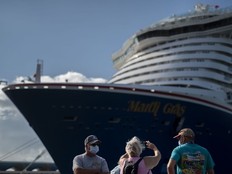Trump movie tariff threat takes aim at multibillion-dollar Canadian film industry
'WE WANT MOVIES MADE IN AMERICA, AGAIN!' president announced in fiery social media post

Article content
With Prime Minister Mark Carney set to meet the U.S. president in Washington Tuesday, Donald Trump is targeting the Canadian film industry by expanding his tariff threats to include movies made outside the U.S.
In a post to his Truth Social page, Trump said he plans to impose a 100% tariff on foreign-made Hollywood movies, a move that would rock Canada’s multibillion-dollar film and television industry.
“The Movie Industry in America is DYING a very fast death. Other Countries are offering all sorts of incentives to draw our filmmakers and studios away from the United States. Hollywood, and many other areas within the U.S.A., are being devastated,” Trump wrote.
Calling foreign film production “a National Security threat,” Trump declared that films shot outside of the U.S. are a form of “messaging and propaganda!”
Trump continued his message by saying he was “authorizing the Department of Commerce, and the United States Trade Representative, to immediately begin the process of instituting a 100% Tariff on any and all Movies coming into our Country that are produced in Foreign Lands. WE WANT MOVIES MADE IN AMERICA, AGAIN!”
“We’re on it,” U.S. Commerce Secretary Howard Lutnick responded.
On Monday morning, White House spokesman Kush Desai said in a statement, “Although no final decisions on foreign film tariffs have been made, the Administration is exploring all options to deliver on President Trump’s directive to safeguard our country’s national and economic security while Making Hollywood Great Again.”
Speaking to reporters in video footage shared by C-SPAN, Trump claimed other countries have been “stealing the … movie-making capability of the United States.”
“I have done some very strong research over the last week, and we are making very few movies now. Hollywood is being destroyed,” he said.
But Canadian producer Robert Lantos, who has worked with David Cronenberg, István Szabó and Atom Egoyan, thinks Trump’s ultimatum is “much ado about nothing.”
“First of all, administering it would be virtually impossible to measure,” Lantos told Postmedia in a phone interview. “What would you base the tariff on since the (filming is taking place) outside the U.S. but most of it is done by Americans? The directors, actors, department heads, most of them are Americans. So are you having tariffs on Americans? … It’s a case of a dog barking. I don’t think it will have the slightest impact.”

Earlier this year, Trump charged Mel Gibson, Jon Voight and Sylvester Stallone with devising a plan to bring business back to Hollywood.
Ironically, Trump’s move to tax films shot outside the U.S. would also affect Gibson’s upcoming Passion of the Christ sequel, which is slated to shoot at Rome’s Cinecitta Studios.
If he was able to convince the majority of studios to relocate productions to the U.S., Trump’s tariff threat would devastate the Canadian film and TV industry, which has successfully lured productions north of the border thanks to millions in tax breaks. In Ontario, major Hollywood studios and streamers helped lift business in the province to the tune of $3.15 billion in 2022 with more than 35,000 people employed in business.
In 2023, Ontario’s film and television industry contributed $1.8 billion to the provincial economy.
Amazon-MGM (The Boys, The Expanse, Reacher and The Handmaid’s Tale), Paramount (Star Trek) and Netflix (The Umbrella Academy, Fubar and Ginny & Georgia) utilize studios in Toronto, and Oscar-winning director Guillermo del Toro shoots his feature films in the city, including his upcoming Frankenstein adaptation starring Jacob Elordi and Oscar Isaac.
Apple filmed multiple seasons of Jason Momoa’s post-apocalyptic drama See in Toronto and Disney recently wrapped work on a Christmas movie featuring the Jonas Brothers that was shot locally.
A decade ago, Warner Bros. spent $80 million shooting the DC superhero film Suicide Squad in the city. The Marvel Cinematic Universe has also paid a visit to Toronto, with shooting on the first Incredible Hulk movie happening in Hogtown back in 2007 as well as the very first X-Men movie in the late ’90s.
In 2017, Netflix committed to spend a minimum of half a billion dollars on original production in Canada over five years. A website set up by the streamer — Netflix in Your Neighbourhood — shows the hundreds of filming locations productions have visited across the country.
After Amazon-MGM inked a multi-year deal to produce shows and movies utilizing the sound stages at Pinewood Toronto Studios last year, Ontario Premier Doug Ford said he wanted to see $5 billion worth of movie and television production take place in the province.
Mayor Olivia Chow also called the film and TV industry a driving economic force in the city that contributes to the “tremendous vibrancy of the whole arts and culture sector.”
Domestic series and feature films also create jobs in Ontario, including Law & Order Toronto: Criminal Intent, Murdoch Mysteries, Children Ruin Everything and Shoresy. The Emmy-winning Schitt’s Creek was also a popular Canadian production that became an international hit.
Recently, Netflix co-produced its first original series commissioned from Canada — the critically-acclaimed Arctic comedy North of North— with the Canadian Broadcasting Corporation (CBC) in partnership with Aboriginal Peoples Television Network (APTN).
Postmedia has reached out to Netflix, Amazon and Disney for further comment.
The bombshell threat of Trump’s tariffs won’t just impact Ontario. After Los Angeles and New York, British Columbia is the third-largest production hub in North America, with HBO’s The Last of Us shooting in the province along with Disney’s popular television adaptation of Rick Riordan’s Percy Jackson book series.
Big-budget movies would also be impacted. The upcoming Mission: Impossible — The Final Reckoning, Jurassic World: Rebirth and the next Avengers film, for example, are also shot around the world.
While Trump hasn’t outlined any details on his pledge to force Hollywood to rethink its business model, various people in the industry have reacted to his “insane” rhetoric.
“So U.S. companies can only make U.S. films? James Cameron can’t make Avatar overseas? Who pays the tariffs? Leading independent distributors would all be out of business if it’s them,” one veteran U.K. producer toldDeadline.
“We just have to wait and see what Trump’s next move is. It’s like in chess. We don’t know where this is going to go,” Italian line producer Marco Valerio Pugini told Variety. “The entertainment industry is a global village … I think the U.S. studios will continue to shoot abroad when they want exotic locations. They aren’t going to start shooting James Bond in Detroit.”
The Canadian Media Producers Association also warned that Trump’s plans to target international productions would hurt both Canadians and Americans.
“While specific details are far from clear at this point, the proposed actions outlined in US President Donald Trump’s announcement will cause significant disruption and economic hardship to the media production sectors on both sides of the Canada-US border,” said Reynolds Mastin, President and CEO of the CMPA.
Andrew Barnsley, President of the Toronto Film School, said Canada’s film and television industry is poised to thrive with or without large-scale American productions.
“While comments about potential U.S. tariffs may shift certain dynamics, Canada continues to offer world-class talent, competitive production incentives, and a thriving creative industries ecosystem,” Barnsley said in a statement to Postmedia.
After decades working in the industry, producing such well-known films as Sunshine, Eastern Promises, The Sweet Hereafter and Crimes of the Future, Lantos said Trump’s fiery post won’t amount to much for one reason: “Hollywood movies dominate the world.”
“Reciprocal tariffs would be devastating for Hollywood studios,” he said. “They would pay the biggest price by far. Whatever punishment this would (look) to cause to films made elsewhere, if there were reciprocal tariffs by the world’s major film markets like China, Japan, the U.K., Germany and France, then Hollywood movies, which dominate all those markets, would be the biggest losers. I’m not going to lose sleep over it.”













Postmedia is committed to maintaining a lively but civil forum for discussion. Please keep comments relevant and respectful. Comments may take up to an hour to appear on the site. You will receive an email if there is a reply to your comment, an update to a thread you follow or if a user you follow comments. Visit our Community Guidelines for more information.